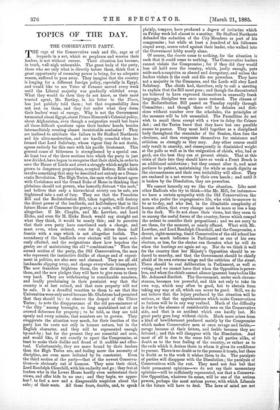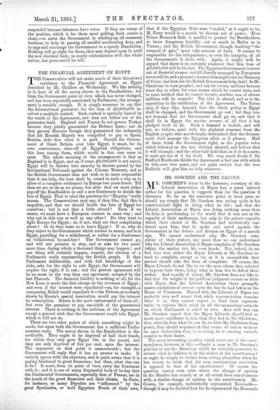TOPICS OF THE DAY.
THE CONSERVATIVE PARTY. THE rage of the Conservative rank and file, rage as of leopards in a net, which so perplexes and worries their leaders, is not without excuse. Their situation has become, in truth, well-nigh unbearable. The great body of the party, those who see only what is directly before them, think that a great opportunity of resuming power is being, for no adequate reason, suffered to pass away. They imagine that the country is longing for a different foreign policy, especially in Egypt, and would like to see Votes of Censure moved every week until the Liberal majority was gradually whittled away. What they would do then they do not know, as their most trusted agent, Mr. Bartley, in his letter to the Times, has just publicly told them ; but that responsibility does not rest on them, and they fret under what they deem their leaders' want of energy. Why is not the Government tormented about Egypt, about Prince Bismarck's Colonial policy, about Afghanistan, even though a resignation would but leave all these difficult questions upon their leaders' hands, besides intermediately creating almost inextricable confusion? They are inclined to attribute the failure to Sir Stafford Northcote and his ultra-moderation, and are hardly consoled when informed that Lord Salisbury, whose vigour they do not doubt, agrees entirely for this once with his pacific lieutenant. This general cause of bitterness is strengthened by a special one. At least two of the three sections into which the party is just now divided, have begun to recognise that their chiefs, in order to save the House of Lords and avert a struggle which might have grown to dangerous proportions, accepted Reform Bills which involve something that may be described not untruly as a Democratic Revolution. The High Tories, the men who at heart agree with Coriolanus and the Grand Duke of Hesse in thinking that plebeians should not govern, who honestly distrust "the mob," and believe that only a hierarchical society can be safe, are frightened into a sort of fury. They see that the Franchise Bill and the Redistribution Bill, taken together, will destroy the direct power of the landlords, and half-believe that in the future House of Commons the gentry, as a caste, will be effaced altogether. If Mr. Chaplin, and Mr. Lowther, and Lord Elcho, and even Sir M. Hicks Beach would say straight out what they think, it would be nearly this ; and to perceive that their own party have sanctioned such a change, and must even, when ordered, vote for it, drives them half frantic with a rage which is not altogether foolish. The ascendancy of the landlords over electors will be most seriously affected, and the resignations show how, hopeless the gentry are of maintaining the old "combinations." Then the second section of the party, the Old Conservatives, the men who represent the instinctive dislike of change and of experiment in politics, are also sore and alarmed. They see all old landmarks slipping away, and change everywhere triumphant. The new franchise frightens them, the new divisions worry them, and the new pledges they will have to give seem to them very hard. They are withdrawing in considerable numbers, and loudly proclaiming in their pessimist way that the country is at last ruined, and that soon property will not be safe. It is a dreadful vexation to them to see that the Universities were only saved because Mr. Gladstone had promised that they should be ; to observe the despair of the Ulster Tories ; to note the disappearance of the old pre-eminence of "the City" among boroughs, so long maintained out of an avowed deference for property ; to be told, as they are told openly and every minute, that numbers are to govern. They exaggerate the situation very much, for their fraction of the party has its roots not only in human nature, but in the English character, and they will be represented enough by-and-by ; but for the present they are resentful and sore, and would like, if not exactly to upset the Compromise, at least to make their dislike and dread of it audible and effectual. Unfortunately, they are more bound by their leaders than the High Tories are, and feeling more the necessity of discipline, are even more irritated by its constraint. Even the third section of the party—that of the newest Conservatives—is obviously out of humour. They miss their chief, Lord Randolph Churchill, with his audacity and go ; they fret at leaders who in the Lower House hardly even understand their views, and offer bide to no one ; and they begin, we appreheni. to feel a new and a disagreeable suspicion about the safety of their seats. All these fears, doubts, and, to speak plainly, tempers, have produced a degree of irritation which on Friday week led almost to a mutiny. Sir Stafford Northcote defended the reduction of the City Members as part of his compromise ; but while at least a ,hundred of his followers stayed away, scores voted against their leader, who walked into the Government lobby nearly alone.
Of course, the Imeute came to nothing, for the situation is such that it could come to nothing. The Conservative leaders cannot violate the Compromise ; for if they did they would lose all hold over the country, which, justly enough, puts aside such a suspicion as absurd and derogatory, and unless the leaders violate it the rank and file are powerless. They have not a majority in the Commons, and the Lords will obey Lord Salisbury. The chiefs had, therefore, only to call a meeting to explain that the Bill must pass ; and though the discontented are believed to have expressed themselves in unusually frank language, discipline was once more restored. The clauses of the Redistribution Bill passed on Tuesday rapidly through Committee ; and though there will be debates and divisions without number over the schedules, the principles of the measure will be left unassailed. The Parnellites do not wish to assail them except with a view to delay the Crimes Act ; and the Tories know that they have but one possible course to pursue. They must hold together as a disciplined body throughout the remainder of the Session, then face the elections, and then reorganise themselves for resistance and criticism as strongly as they may. Any other course could only result in anarchy, and consequently in diminished weight at the polls as well as in the resignation of chiefs, who, bad or good, are the best they can at present obtain. That at this crisis of their fate they should have so weak a Front Bench is an additional misfortune-; but they cannot alter it, and must perforce be patient, maintaining the while as much dignity as the circumstances and their own irritability will allow. They are enclosed in a net woven by their own hands ; and until it is broken by the Dissolution, they are powerless.
We cannot honestly say we like the situation. Like most other Radicals who try to think—like Mr. Mill, for instance— we have a certain sympathy with the Old Conservatives, the men who prefer the unprogressive life, who wish to-morrow to be as to-day, and who feel, in the illimitable complexity of human affairs, that every change must be more or less a leap in the dark. We do not share their views, but they seem to us among the useful forces of the country, forces which compel the ardent to consider their propositions ; and we are sorry to see them, for the moment, so nearly effaced. What with Mr. Lowther, and Lord Randolph Churchill, and the Compromise, a decent, right-meaning, timid Conservative of the old school has about as much influence in Parliament as one of his own electors, or less, for the elector can threaten what he will do when the hustings are again set up. Nor do we think it well for the country that her Majesty's Opposition should be reduced to anarchy, and that the Government should be chiefly afraid of its own extreme wings and the criticism of the street. There should be real deliberation in Parliament, as well as voting, and we cannot have that when the Opposition is powerless, and when the chiefs cannot silence ignorant busybodies like Mr. Ashmead-Bartlett. The Government, under such circumstances, becomes too powerful, and this not only to take its own way, which may often be good, but to abstain from taking any way at all, which can never be good. Still, we do not believe that the injury produced by the situation will be serious, or that the apprehensions which make Conservatives so furious will be in any way realised. Much of the difficulty is due to the absence of considerable men on the Conservative side, and that is an accident which can hardly last. No great party goes long without chiefs. Much more arises from a kind of bewilderment produced mainly by the Compromise which makes Conservative men at once savage and feeble,— savage because of their fetters, and feeble because they are fettered ; and this will disappear with the Dissolution. And most of all is due to the sense felt by all parties alike, of doubt as to the true feeling of the country, or rather as to the ends which it desires those to whom it gives its confidence to pursue. There is no doubt as to the persons it trusts, but there is doubt as to the work it wishes them to do. The paralysis of parties will disappear with the Dissolution ; the paralysis of Conservatives with the rest. They need not fear but that their permanent opinions—we do not say their momentary opinions—will be sufficiently represented, nor that a Conservative Opposition, whatever its name, will be one of the serious powers, perhaps the most serious power, with which Liberals in the future will have to deal. The laws of mind are not suspended because labourers have votes. If they are weary of the position, which is for them most galling, their course is clear,—to assist the Government in winding-up all necessary business, to help in passing all needful accelerating Acts, and to urge and encourage the Government to a speedy Dissolution. Nothing will go right for them, they may depend upon it, until the new electoral body, so nearly conterminous with the whole nation, has pronounced its will.



































 Previous page
Previous page